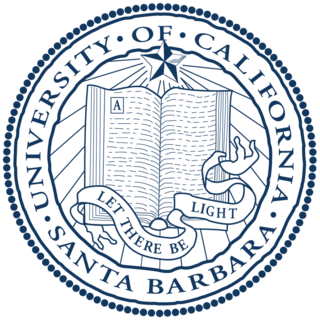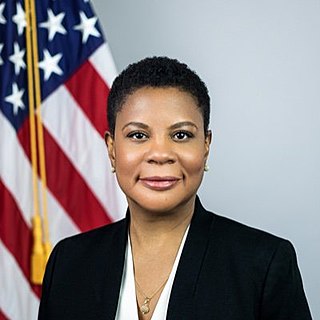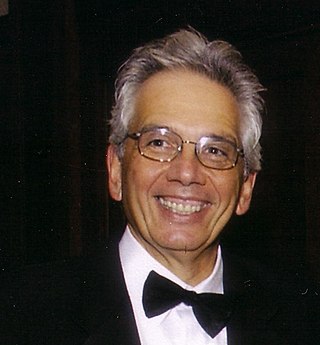Related Research Articles

Columbia University,also known as Columbia,and officially as Columbia University in the City of New York,is a private Ivy League research university in New York City. Established in 1754 as King's College on the grounds of Trinity Church in Manhattan,Columbia is the oldest institution of higher education in New York and the fifth-oldest institution of higher learning in the United States. It is one of nine colonial colleges founded prior to the Declaration of Independence,and a member of the Ivy League. Columbia is ranked among the most prestigious universities in the world.

The University of California,Santa Barbara is a public land-grant research university in Santa Barbara,California. It is part of the University of California 10-university system. Tracing its roots back to 1891 as an independent teachers' college,UCSB joined the University of California system in 1944 and is the third-oldest undergraduate campus in the system,after UC Berkeley and UCLA. In 2021,the university enrolled 23,196 undergraduate and 2,983 graduate students.

The Princeton School of Public and International Affairs is a professional public policy school at Princeton University. The school provides an array of comprehensive coursework in the fields of international development,foreign policy,science and technology,and economics and finance through its undergraduate (AB) degrees,graduate Master of Public Affairs (MPA),Master of Public Policy (MPP),and PhD degrees.

David Jonathan Gross is an American theoretical physicist and string theorist. Along with Frank Wilczek and David Politzer,he was awarded the 2004 Nobel Prize in Physics for their discovery of asymptotic freedom. Gross is the Chancellor's Chair Professor of Theoretical Physics at the Kavli Institute for Theoretical Physics (KITP) of the University of California,Santa Barbara (UCSB),and was formerly the KITP director and holder of their Frederick W. Gluck Chair in Theoretical Physics. He is also a faculty member in the UCSB Physics Department and is currently affiliated with the Institute for Quantum Studies at Chapman University in California. He is a foreign member of the Chinese Academy of Sciences.

Galen D. Stucky is an American inorganic materials chemist who is a Distinguished Professor and the Essam Khashoggi Chair In Materials Chemistry at the University of California,Santa Barbara. He is noted for his work with porous ordered mesoporous materials such as SBA-15. He won the Prince of Asturias Award in 2014,in the Scientific and Technological Research area. Stucky was elected a member of the American Association for the Advancement of Science in 1994,a member of the American Academy of Arts and Sciences in 2005,and a member of the National Academy of Sciences in 2013.

The College of Engineering (CoE) is one of the three undergraduate colleges at the University of California,Santa Barbara.

Alondra Nelson is an American policy advisor,non-profit administrator,academic,and writer. She is the Harold F. Linder Chair and Professor in the School of Social Science at the Institute for Advanced Study,an independent research center in Princeton,New Jersey. She is deputy assistant to the president and principal deputy director for science and society of the White House Office of Science and Technology Policy (OSTP),where she performed the duties of the director from February to October 2022. From 2017-2021,she was president and CEO of the Social Science Research Council,an independent,nonpartisan international nonprofit organization. She was previously professor of sociology at Columbia University,where she served as the inaugural dean of social science,as well as director of the Institute for Research on Women and Gender. She began her academic career on the faculty of Yale University.
The Center for Information Technology &Society at the University of California,Santa Barbara was founded in 1999 to support the interdisciplinary study of the cultural transitions and social innovations associated with contemporary information technology. CITS accomplishes this by connecting scholars in different disciplines studying similar phenomena related to technology and society,through both formal events and informal meetings of the center's faculty research affiliates. Currently,CITS faculty represent 13 departments on campus,spanning the Social Sciences,the College of Engineering,and the Humanities. In addition,the center supports graduate study through the administration of the Technology &Society Emphasis on campus. CITS is housed in the campus Office of Research,as a unit of the Institute for Social,Behavioral,and Economic Research at the university.
The Center for Nanotechnology in Society at the University of California at Santa Barbara (CNS-UCSB) is funded by the National Science Foundation and "serves as a national research and education center,a network hub among researchers and educators concerned with societal issues concerning nanotechnologies,and a resource base for studying these issues in the US and abroad." The CNS-UCSB began its operations in January 2006.

Samir Mitragotri is an Indian American professor at Harvard University,an inventor,an entrepreneur,and a researcher in the fields of drug delivery and biomaterials. He is currently the Hiller Professor of Bioengineering and Hansjörg Wyss Professor of Biologically Inspired Engineering at Harvard John A. Paulson School of Engineering and Applied Sciences and the Wyss Institute for Biologically Inspired Engineering. Prior to 2017,he was the Duncan and Suzanne Mellichamp Chair Professor at University of California,Santa Barbara.

Dawn Jeannine Wright is an American geographer and oceanographer. She is a leading authority in the application of geographic information system (GIS) technology to the field of ocean and coastal science,and played a key role in creating the first GIS data model for the oceans. Wright is Chief Scientist of the Environmental Systems Research Institute. She has also been a professor of geography and oceanography at Oregon State University since 1995 and is a former Oregon Professor of the Year as named by the Council for the Advancement and Support of Education and the Carnegie Foundation for the Advancement of Teaching. Wright was the first African-American female to dive to the ocean floor in the deep submersible ALVIN. On July 12,2022 she became the first Black person to dive to Challenger Deep,the deepest point on Earth,and to successfully operate a sidescan sonar at full-ocean depth.

Richard D. Gitlin is an electrical engineer,inventor,research executive,and academic whose principal places of employment were Bell Labs and the University of South Florida (USF). He is known for his work on digital subscriber line (DSL),multi-code CDMA,and smart MIMO antenna technology all while at Bell Labs.
Francis "Frank" J. Doyle III is the dean of the Harvard John A. Paulson School of Engineering and Applied Sciences and the John A. and Elizabeth S. Armstrong Professor of Engineering and Applied Sciences. He is also affiliated with the Division of Sleep Medicine of Harvard Medical School. On December 15,2022 it was announced that Doyle will serve as the 14th provost of Brown University starting in the 2023 academic year.
Richard Hugh Sibson is a New Zealand structural geologist and emeritus professor at the University of Otago,who has received numerous honors and awards for his work in the field of earthquake research. He has caused a 'fundamental shift' in the interpretation of the relationship between earthquakes and fault zone geology and on the origin of fault-hosted mineral deposits.

Barbara Lynn Schneider is an American sociologist and education scholar. She is the John A. Hannah Chair and University Distinguished Professor in the College of Education and Department of Sociology at Michigan State University (MSU).
Craig Alexander Carlson is an American oceanographer. He is a founding co-editor of the Annual Review of Marine Science and a recipient of the 2015 G. Evelyn Hutchinson Award.

Denise Johnson Montell is an American biologist who is the Duggan Professor of Molecular,Cellular,and Developmental Biology at the University of California,Santa Barbara. Her research considers the oogenesis process in Drosophila and border cell migration. She has served as President of the Genetics Society of America and was elected to the National Academy of Sciences in 2021.
Thomas A. DiPrete is the Giddings Professor of Sociology,co-director of the Institute for Social and Economic Research and Policy at Columbia University.
Michael S. Lubell is an American physicist. He is the Mark W. Zemansky Professor of Physics at the City College of New York.
References
- 1 2 3 4 "Richard Appelbaum | Department of Global Studies – UC Santa Barbara". www.global.ucsb.edu. Retrieved May 30, 2022.
- ↑ "Richard Appelbaum, PhD – Summer Session 2021" . Retrieved May 30, 2022.
- ↑ Columbia College (Columbia University). Office of Alumni Affairs and Development; Columbia College (Columbia University) (1967–1969). Columbia College today. Columbia University Libraries. New York, N.Y. : Columbia College, Office of Alumni Affairs and Development.
- ↑ "For China to realise its research and innovation potential the government may have to place greater trust in the academic community". Impact of Social Sciences. May 9, 2018. Retrieved May 30, 2022.
- ↑ "Supply Chains and Workers' Chains: Key to Understanding Climate Change and Sustainability". Fielding Graduate University. April 21, 2020. Retrieved May 30, 2022.
- ↑ "Innovation Policy in China". obo. Retrieved May 30, 2022.
- ↑ "Richard Appelbaum | CNS.UCSB". www.cns.ucsb.edu. Retrieved May 30, 2022.
- ↑ "WSN discussions: : free issue of new journal". wsarch.ucr.edu. Retrieved May 30, 2022.
- ↑ "AAAS Members Elected as Fellows | American Association for the Advancement of Science". www.aaas.org. Retrieved May 30, 2022.